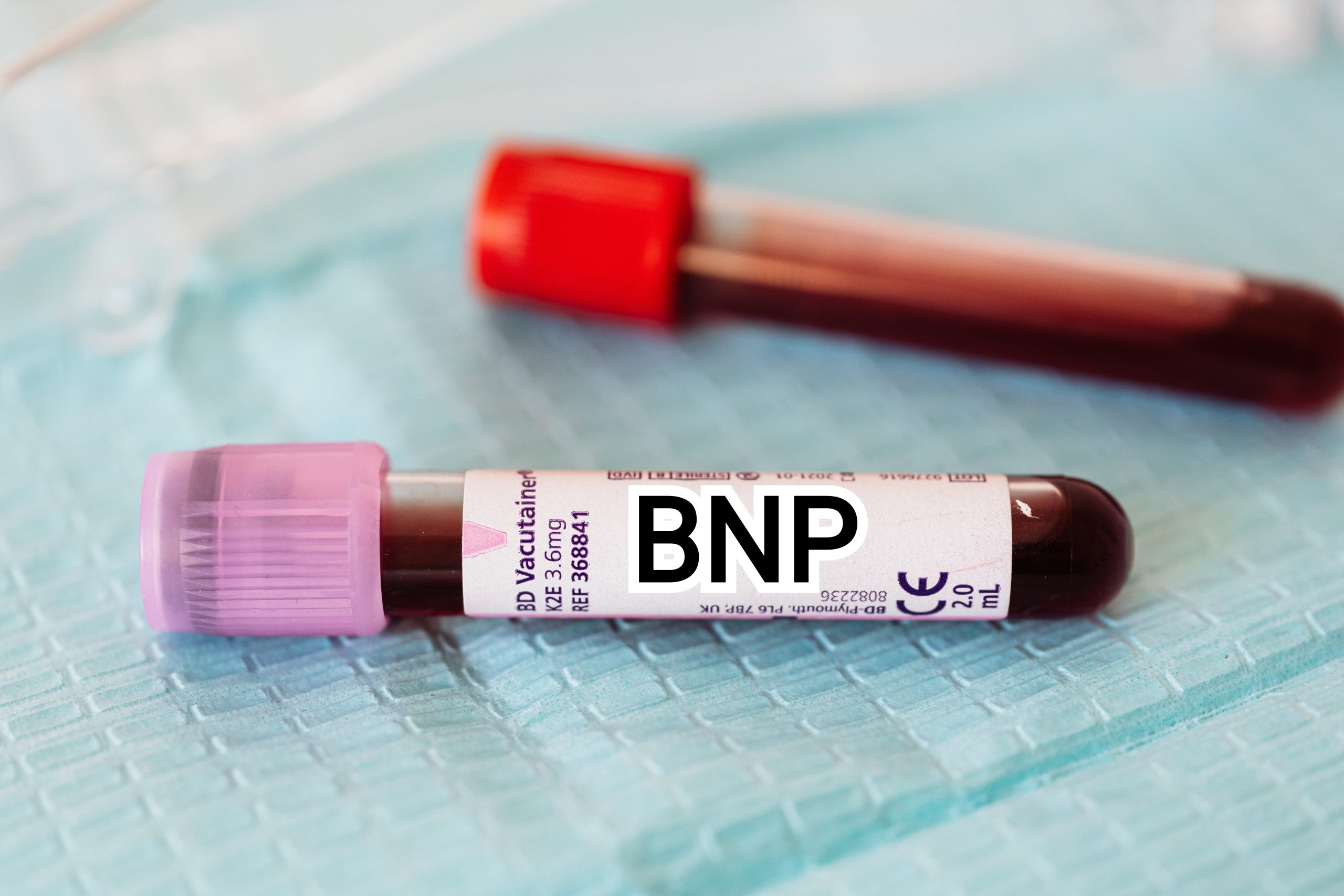
10 causes of raised BNP without Heart Failure
-
- Dr. Junaid Arshad
- January 15, 2022
- 0 comments
Table of Contents
What are the causes of raised BNP other than heart failure?
Brain natriuretic peptide (BNP) is a hormone produced by the ventricles of the heart as a result of increased ventricular filling pressure or an increased stretch on ventricular walls. [1]
Raised BNP levels may help establish the diagnosis of heart failure.
The European Society of Cardiology 2021 guidelines for heart failure, recommend measuring BNP levels in all suspected cases of heart failure. [2]
Can BNP be elevated without heart failure?
Raised BNP levels do not always mean heart failure as they can be elevated in a list of other conditions which are as below:
- Renal failure
- Valvular heart disease
- Sepsis
- Pulmonary hypertension
- Constrictive pericarditis
- Old age
- Female gender
- Liver cirrhosis
- Hyperthyroidism
- Cancer
Details of these causes are as under.
Renal Failure

In patients suffering from renal failure, the levels of both BNP & NT-proBNP are elevated irrespective of heart failure.
The reason for raised levels in these patients is decreased GFR(glomerular filtration rate).
GFR is inversely related to BNP concentrations.
Left ventricular hypertrophy(LVH) & volume expansion are the other factors responsible for elevated BNP levels.
Hence the cut-off values of BNP for the diagnosis of heart failure in renal failure patients are different from those with normal kidneys.
Research data to establish clear cut-off values is lacking but according to a study done on 599 patients who came to the emergency room with shortness of breath, the following results were obtained. [5]
- 1. Those who had an estimated GFR of ≥60 mL/min per 1.73 m2 had a BNP cut-off value of >450 pg/ml in patients who were less than 50 years of age and >900 pg/ml in older patients and these values had a sensitivity and specificity of 85 and 88% respectively for the diagnosis of heart failure.
- 2. Conversely, those with a GFR of <60 mL/min per 1.73 m2 had a cut-off value of 1200pg/ml with a sensitivity and specificity of 89 and 72% respectively.
Valvular Heart Disease

Patients with valvular heart disease like mitral regurgitation(MR) or aortic stenosis(AS) can have raised BNP levels and in this case, it may have a prognostic role. [6]
Very high BNP levels may be linked to adverse outcomes and increased mortality in patients who undergo mitral valve replacement surgery for MR. [7]
Sepsis

Studies suggest that BNP levels are as likely to be raised in sepsis as in decompensated heart failure. [8]
Pulmonary hypertension

Plasma BNP levels are raised in patients with both primary and secondary pulmonary hypertension.
In these patients, plasma BNP levels are directly related to right atrial pressure, pulmonary vascular resistance, and right ventricular mass.
Serial BNP measurement may help improve management in patients with primary pulmonary hypertension.[9]
Restrictive cardiomyopathy

BNP levels may help differentiate between restrictive cardiomyopathy and constrictive pericarditis.
Restrictive cardiomyopathy is associated with a greater wall stretch and hence a greater increase in BNP levels as compared to constrictive pericarditis.
This fact has been supported in small studies.
A study included 6 patients with constrictive pericarditis and 5 patients with restrictive cardiomyopathy. BNP levels were significantly raised in restrictive cardiomyopathy (825 versus 128 pg/mL). [10]
Old Age

Elderly patients have higher than normal BNP levels probably because they have some degree of left ventricular systolic dysfunction & diastolic dysfunction, although they don’t have overt heart failure. [11]
Also, a normal decline in GFR with age may contribute to increased BNP levels.
Female gender

BNP levels are higher in women as compared to men irrespective of underlying heart disease.
The reason for these raised levels is not clearly understood.
Raised estrogen levels may be responsible for raised BNP as was observed in women on HRT. [12]
Raised BNP levels are also seen during pregnancy but usually, they remain within the normal range.
Liver Cirrhosis

Patients with liver cirrhosis have raised BNP levels probably because of hyperdynamic state and cirrhotic cardiomyopathy.
Several studies have shown that higher BNP levels are associated with advanced cirrhosis and poor outcomes. [13]
Hyperthyroidism

Thyroid hormone directly stimulates the secretion of BNP and hence raised levels are present in patients of both overt hyperthyroidism and sub-clinical hyperthyroidism.
A study suggests that the BNP levels may be as high as 5 times in a hyperthyroid patient as compared to a euthyroid. [14]
Cancer

Raised levels of BNP in patients with malignancy are probably due to cancer-related inflammation.
Hence the significance of BNP levels for the diagnosis of heart failure is reduced. [15]
A separate article explains in detail the causes, diagnosis, and treatment options for heart failure. Click here
Other details of BNP
BNP is produced from the ventricles of the heart as a pro-hormone called pro-BNP.
This pro-BNP is broken down into 2 components.
- 1. BNP which is biologically active and is made up of 32 amino acids and
- 2. N-terminal pro-BNP (NT-proBNP) which is biologically inactive and is made up of 76 amino acids.
Another natriuretic peptide released from the atria of the heart is the Atrial natriuretic peptide (ANP).
The natriuretic peptides are involved in the regulation of salt and water and help the body get rid of extra water.
It also helps remove sodium via the kidneys.
Both BNP and ANP levels are raised in patients with heart failure.
Commonly Asked Questions about BNP Levels
Can you have Congestive Heart Failure with a normal BNP?
Congestive heart failure with a normal BNP level is very less likely. BNP levels have a very high negative predictive value, this means that normal BNP levels almost always rule out the diagnosis of heart failure and alternative diagnoses for the patient’s symptoms should be considered in such cases.
- BNP<100pg/ml
- NT-pro-BNP<300pg/ml
- MR-proANP<120pg/ml
What is MR-proANP
Midregional pro-atrial natriuretic peptide (MR-proANP) is one of the members of natriuretic peptides.
It is a novel peptide first isolated in 1981 & has similar functions of diuresis and natriuresis as BNP and NT-pro-BNP. [17]
Can BNP levels decrease in patients with heart failure?
Yes, treating heart failure can decrease BNP levels and the percentage reduction in BNP levels can predict future outcomes.
Several studies have suggested that a greater percentage reduction in BNP levels is associated with better outcomes.[18]
Important Statistics on Heart Failure (2023 Update)
Given below are the latest statistics given by American Heart Association
A recent study shows that there are around 6.7 million Americans who are over the age of 20 with heart failure, which is higher than the previous estimate of 6 million.
Another study found that the risk of developing heart failure has increased in recent years, with a lifetime risk of 22.6% in females and 25.3% in males who are 50 years of age.
Although treatments for heart failure have improved, the survival rate after a diagnosis may not be improving as much as before.
In fact, the estimated 5-year mortality rate after a heart failure diagnosis has remained high, at 52.6% overall, 24.4% for those who are 60 years of age, and 54.4% for those who are 80 years of age.
Summary
BNP levels can be elevated in a long list of conditions apart from heart failure. A few important and common ones include renal failure, sepsis, pulmonary hypertension, and valvular heart diseases.
Raised BNP levels have a limited role in the diagnosis of heart failure.
BNP levels have a high negative predictive value and hence normal levels help exclude the diagnosis of heart failure.
In heart failure patients with elevated BNP, treating heart failure can decrease BNP levels, and a greater reduction is associated with better future outcomes.




